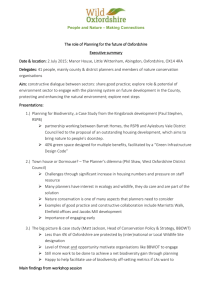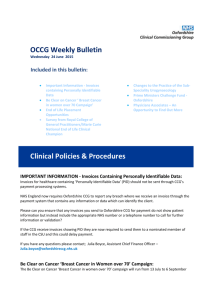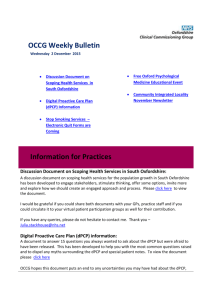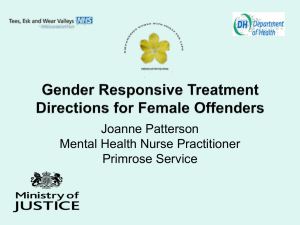31i_BOD_COO-Report-March-2014
advertisement
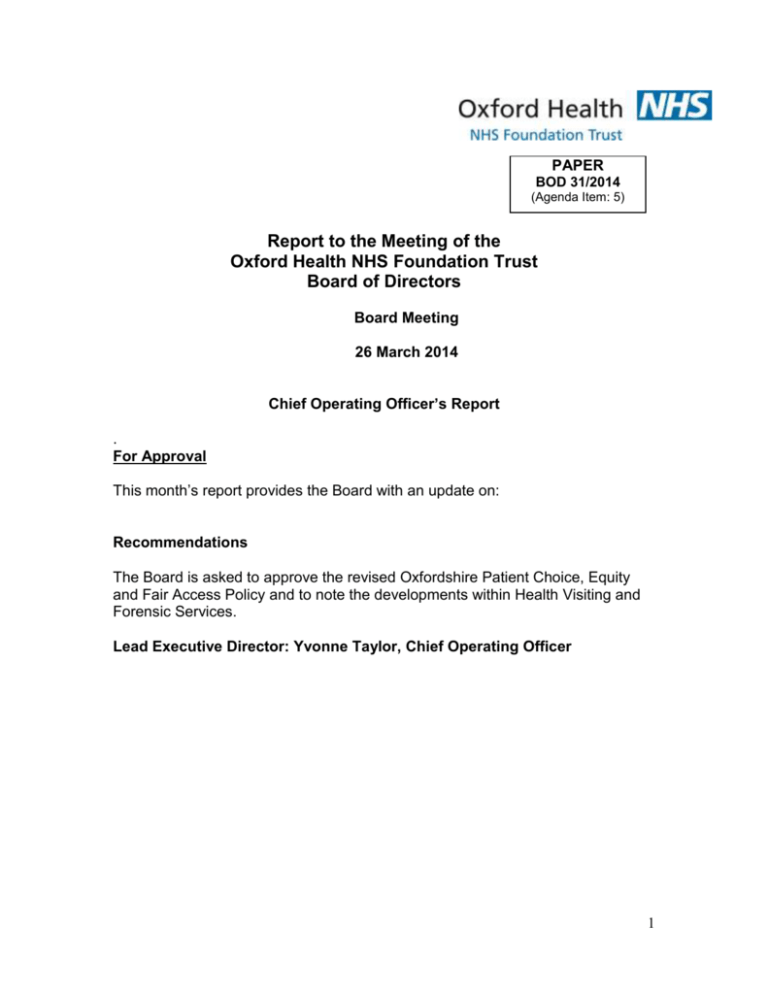
PAPER
BOD 31/2014
(Agenda Item: 5)
Report to the Meeting of the
Oxford Health NHS Foundation Trust
Board of Directors
Board Meeting
26 March 2014
Chief Operating Officer’s Report
.
For Approval
This month’s report provides the Board with an update on:
Recommendations
The Board is asked to approve the revised Oxfordshire Patient Choice, Equity
and Fair Access Policy and to note the developments within Health Visiting and
Forensic Services.
Lead Executive Director: Yvonne Taylor, Chief Operating Officer
1
1. OXFORDSHIRE PATIENT CHOICE, EQUITY AND FAIR ACCESS POLICY
Oxfordshire has a Patient Choice, Equity and Fair Access Policy in place to
which all statutory health and social care organisations are signatories. The
purpose of the policy is to provide a clear framework for managing the small but
persistent numbers of patients who are delayed in an inpatient setting which is
now longer appropriate for their needs due to the personal choice of the patient
or the family. This policy is compliant with the legislation on patient choice.
A review of the current Patient Choice, Equity and Fair Access Policy was agreed
as a whole-system action as part of the joint work led by the CCG to improve
patient flow along the supported discharge pathway (and thus reduce the number
and length of delayed transfers of care and improve performance against the
A&E four hour standard). This is one of a number of cross-organisational actions
to improve patient flow through the urgent care pathway.
The consequences of all delays to patients (whether the source of the delay is by
the statutory organisations or patient choice) are:
The patient is exposed to an unnecessary risk of hospital-acquired
infection
Frustration and distress may be caused to patients and/or their relatives
whilst waiting for a preferred discharge destination to become available.
The needs of the person can be more appropriately met in a lower-acuity
setting, including a non-hospital environment
Decreased level of patient independence, as a bed based environment
is not designed to meet the needs of people who are medically well.
Increased pressure within the health care system due to the
unnecessary use of hospital beds.
The focus of the review was to ensure that we are sufficiently proactive in
engaging with patients and carers early in the admission regarding onward care,
supported by an explicit choice policy and patient-specific letters given to families
at specified points during the process. This approach was favoured by the clinical
leads involved in this revision process.
The revisions to the policy include:
Inclusion of the changes regarding choice for patients awaiting a
community hospital bed but are delayed for patient choice reasons
Inclusion of the continuing health care interim pathway from acute
2
Patient letters standardised across all organisations
Patient letters updated to reflect the revised supported discharge pathway,
as outlined in the supported discharge operating policy (crossorganisational improvements in processes)
Patient letters included to explain to patients / relatives when they are
delayed because we cannot source the ongoing care needed, and
explaining what we are doing about it
A review of the patient letters will take place with the Health and Social Care
Forum (a group of patients and carers who provide a “critical friend” role to
service developments, hosted by Age UK) on March 26th.
The Board is asked to approve the updated Oxfordshire Patient Choice, Equity
and Fair Access Policy.
2. HEALTH VISITING
The Trust provides health visiting services for children aged 0-5 and their families
throughout Oxfordshire. Health visitors lead the Healthy Child Programme to
ensure a healthy start for every family. Health visitors are qualified nurses or
midwives with specialist training in public health, child development and
protecting children. Our health visiting teams, also including community staff
nurses, nurses and healthcare support workers, provide advice and support the
health and wellbeing of babies, children and their families.
The Health Visitor Implementation Plan 2011-2015
The government’s Health Visitor Implementation Plan was launched in early
2011, setting out a vision which recognised that the start of life is a crucial time
for children and parents, and that good, well-resourced health visiting services
can help ensure that families have a positive start.
The plan specifically set out a ‘call to action’, with the challenging commitment to
provide an extra 4,200 health visitors before the next General Election in 2015,
reversing years of decline.
The plan also set out a newly transformed service which would be made possible
by these additional health visitors, covering four ‘offers’: community, universal,
universal plus (specific expert help) and universal partnership plus (multi-agency
response to complex issues over time), as well as safeguarding children.
3
Progress in Oxfordshire
The workforce growth target for our services translated to an increase from 96.2
to 122.6 whole time equivalents by March 2015, a rise of 26.4 (22%) for
Oxfordshire. We are on track to deliver against this trajectory, though others
in the Thames Valley cluster are struggling to train enough new health visitors,
and the national position remains tight.
Building on this success, new health visitors are now graduating and boosting
our workforce, allowing us to deliver on our plan to put in place the new service
offer. Highlights include:
Early Implementer: the Department of Health awarded Oxfordshire ‘early
implementer’ status, along with 22 areas in its second wave of
implementation. This allowed us to share good practice such as our
approach to 2 year reviews and our monthly e-newsletter, and learn from
other high-performing Trusts.
Baby-Friendly Initiative: Oxfordshire was awarded £24k from the
Department of Health in February 2014, to implement stage 1 ('Building a
firm foundation') of the UNICEF ‘Baby Friendly Initiative’ across health
visiting in Oxfordshire, which will support breastfeeding and parent-infant
relationships
Ages & Stages: a significant development has been the successful
introduction of the evidence-based Ages & Stages questionnaire at the 2
year review to ensure school readiness. 100% of staff have now been
trained, and 94% of families now benefit. 85% of parents report an
increased understanding of their child’s development when using the tool.
Performance: Commissioners have commented on the professionalism
of the team and project management approach, and feedback from
families shows a high satisfaction with the service.
3. FORENSIC PERSONALITY DISORDER SERVICE DEVELOPMENTS
Offender Personality Disorder Pathway
As part of a national programme to re-allocate DSPD funding, The National
Offender Management Service (NOMS) and the DH launched a new set of
funding for a community-based PD pathway for offenders managed by the
National Probation Service in 2012/13. The idea of the pathway is augment the
knowledge and skill-base of offender managers by providing Specialist Offender
Managers and Forensic/Clinical Psychology support. The initial plan was to pilot
this service in the Thames Valley region, within West Berkshire and Oxfordshire
but we have recently had confirmation that the service can run region-wide from
1 April 2014.
4
The role of the service is to identify individuals who present a high risk of harm to
others (as flagged by the OASys Risk Assessment Items). The psychologist and
specialist offender manager then review the case (considering the likelihood of
personality disorder and the impact this has on case management), meet with
the offender manager supervising the offender and provide case consultation and
a case formulation. In some instances this may also mean assessing the
offender. The psychology staff are also to provide workforce development for
probation staff in understanding personality disorder.
This service is clinically led by Anna Motz, Consultant Clinical and Forensic
Psychologist (OHFT), with operational overview by Jude Deacon, Head of Low
Secure and Community Forensic Services and additional support is provided by
Andrew Bates, Senior Forensic Psychologist (Thames Valley Probation). The
contract is an excellent example of partnership working and so far has been very
valued by the probation staff.
Thames Valley Pathfinder Service
NHS England has been keen to develop services to help manage the health
pathways of individuals with personality disorder who present a significant risk of
harm to others. In AWP, a Pathfinder service has been running for some time,
which has led to more effective pathway management of higher risk personality
disorder offenders (those who could not access services such as Complex
Needs). In February 2014, our bid to develop this service for the Thames Valley
was approved by NHS England (Wessex Team). This means we will be able to
develop a service that identifies individuals currently within health (or soon to be
returning to health services) who have a personality disorder and require
additional pathway management and psychological treatment in the community.
The service will operate across Oxfordshire, Buckinghamshire (including Milton
Keynes) and Berkshire. The service will provide specialist psychological
assessment and treatment for individuals and groups of individuals and thereby
seek to reduce the need for urgent hospital admissions, reduce the risk of reoffending, and reduce the risk of inappropriate longer term placements in the
independent sector.
This service will also be clinically led by Anna Motz, Consultant Clinical and
Forensic Psychologist, with operational overview provided by Jude Deacon,
Head of Low Secure and Community Forensic Services.
5
